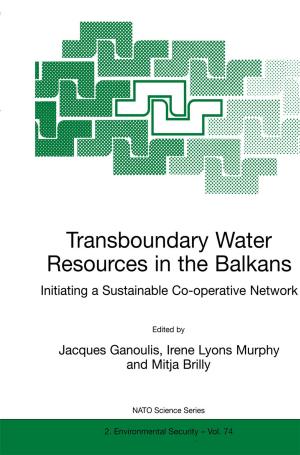Water Pollution and Abatement Policy in India
A Study from an Economic Perspective
Nonfiction, Science & Nature, Technology, Environmental, Business & Finance, Economics| Author: | Kakali Mukhopadhyay, Debesh Chakraborty | ISBN: | 9789401789295 |
| Publisher: | Springer Netherlands | Publication: | July 7, 2014 |
| Imprint: | Springer | Language: | English |
| Author: | Kakali Mukhopadhyay, Debesh Chakraborty |
| ISBN: | 9789401789295 |
| Publisher: | Springer Netherlands |
| Publication: | July 7, 2014 |
| Imprint: | Springer |
| Language: | English |
India has been traditionally well-endowed with large freshwater reserves, but increasing population, urbanization and agricultural growth in recent decades are causing overexploitation of surface and groundwater. As consumption of water grows, wastewater increases significantly and in the absence of proper measures for treatment and management, is polluting existing freshwater reserves. As a result, water pollution has emerged as one of the nation’s gravest environmental threats.
This book draws a link between water pollution generated by different industries and the various economic activities of the Indian economy using the Input-output framework. It constructs a detailed water pollution coefficient matrix involving different types of water pollutants. The book estimates the total amount of water pollution generated directly and indirectly in different sectors and activities, and also calculates the water pollution content in India’s foreign trade sector. It also accounts for defensive expenditure from water pollution and estimates Green GDP for the extent and scope of environmental challenges. Analysis of the result indicates the variation in the pollution content of different economic activities. Finally, the book offers a portfolio of policies and assesses the implications of such policies on pollution generation in India.
India has been traditionally well-endowed with large freshwater reserves, but increasing population, urbanization and agricultural growth in recent decades are causing overexploitation of surface and groundwater. As consumption of water grows, wastewater increases significantly and in the absence of proper measures for treatment and management, is polluting existing freshwater reserves. As a result, water pollution has emerged as one of the nation’s gravest environmental threats.
This book draws a link between water pollution generated by different industries and the various economic activities of the Indian economy using the Input-output framework. It constructs a detailed water pollution coefficient matrix involving different types of water pollutants. The book estimates the total amount of water pollution generated directly and indirectly in different sectors and activities, and also calculates the water pollution content in India’s foreign trade sector. It also accounts for defensive expenditure from water pollution and estimates Green GDP for the extent and scope of environmental challenges. Analysis of the result indicates the variation in the pollution content of different economic activities. Finally, the book offers a portfolio of policies and assesses the implications of such policies on pollution generation in India.















